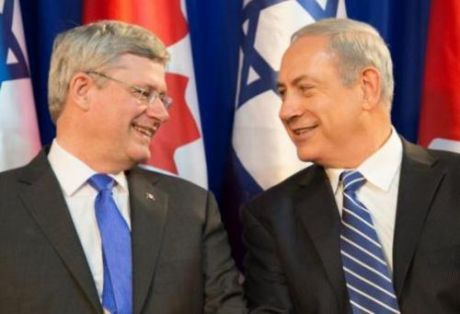Features
You are here
Why does Harper support Israel?

January 25, 2014
After years of defending Israel, Canadian Prime Minister Stephen Harper made his first visit historic: taking a 200-strong delegation, becoming the first Canadian Prime Minister to address the Israeli Knesset, and receiving a ceremonial key and multiple standing ovations in return. One Israeli politician described Harper as a “spokesman of Israel’s Foreign Ministry.”
Popular explanations: votes, commerce and faith
There have been many explanations for Harper’s pro-Israel policy. The Economist debunked many popular explanations—the pursuit of ethnic votes or financial deals, or his personal relationship with Israeli president Benjamin Netanyahu—and settled on Harper’s religious faith: “There are about 329,000 Jews in Canada, compared with just over 1 million Muslims, so the electoral advantages of such a pro-Israel stance are not obvious. The economic advantages are also slight. Although Canada has had a free-trade agreement with Israel since 1997, total bilateral trade of C$1.4 billion ($1.3 billion) is less than what Canada and the United States trade in a single day. Mr Harper’s warm relationship with Mr Netanyahu has some appeal as an explanation, but overlooks the long-standing nature of the Canadian leader’s commitment to Israel. He has stuck with the policy while leading two minority governments and a majority government, and through the ups and downs of his own poll ratings. The best explanation is the simplest: Mr Harper genuinely believes in the policy (perhaps shaped by his religion—he is an evangelical Christian.)”
It’s true that the evangelical Christian population in Canada is far greater than the Jewish population, and that Christian zionists are a far more important part of the Conservative party base that Harper is trying to mobilize. But reducing the explanation to votes and faith ignores the broader geopolitical explanations. Buried in the propaganda of Harper’s Knesset speech was a more accurate explanation of the multiple reasons the Canadian state supports Israel: “The friendship between us is rooted in history, nourished by shared values, and it is intentionally reinforced at the highest levels of commerce and government.... It is also of strategic importance, also a matter of our own long-term interests.”
Colonial history and values
Canada has a long and ongoing history of colonialism, and has supported other colonial regimes around the world—from South Africa to Israel. As Harper pointed out in his speech, the Canadian government turned away boats of Jewish refugees fleeing the Holocaust in the 1930s. But Harper’s support of Israel shows how the West then cynically used the Holocaust to support a colonial project on Palestinian land.
Having previously declared that Canada has “no history of colonialism,” Harper applied the same colonial whitewashing to Israel, which he praised as “the bloom that the desert has yielded”—erasing the catastrophe that this “bloom” has meant for Palestinians. Just as Harper’s commitment to “a strong Canada” undermines indigenous sovereignty, his defense of a “free, democratic and distinctively Jewish state” ignores the lack of freedom and democracy for the indigenous Palestinian population. As Arab-Israeli Knesset member Ahmad Tibi explained after he disrupted and stormed out of Harper’s speech: "When you are controlling, discriminating, confiscating, occupying lands from one side and putting them in the corner without any basic rights, you are by this way ruling and committing apartheid in the occupied Palestinian Territories."
Commerce and government
The West intentionally reinforces Israeli apartheid to control the region, commercially and militarily: as Harper noted, “our military establishments share information and technology. This has also been to our mutual benefit.”
Harper also has a long record of providing diplomatic support to Israel: making Canada the first to cut humanitarian aid to Gaza after its democratic elections in 2006, defending Israel’s massacre in Lebanon as a “measured response” in 2009, welcoming Netanyahu to Canada as Israeli commandos were killing peace activists on the Gaza flotilla in 2010.
The Harper government has also used defense of Israel as justification for attacking civil liberties in Canada—barring Palestinian solidarity speakers from the country, cutting funds to NGOs who support human rights in Palestine, censoring Palestine solidarity events on campus, and labeling criticism of Israel as “the new anti-Semitism.”
As Harper claimed, “it targets the Jewish people by targeting Israel and attempts to make the old bigotry acceptable for a new generation... But what else can we call criticism that selectively condemns only the Jewish state and effectively denies its right to defend itself while systematically ignoring—or excusing—the violence and oppression all around it?...One must look beyond Israel’s borders to find the causes of the relentless oppression, poverty and violence in much of the region.”
Imperial strategy abroad and at home
The ridiculous claim that those who support Palestinian liberation also support repressive regimes in the region is meant to silence criticism of Israel and to distract from the real supporters of those regimes: the same Western governments who arm Israel.
Harper supported Egyptian dictator Hosni Mubarak until the day he was overthrown. Canada has sold weapons to Saudi Arabia, last year John Baird went on an imperialist tour of repressive regimes—from Bahrain to UAE to Qatar—and after visiting Israel, Harper made a stop in the monarchy of Jordan. This broader context shows the imperial architecture that the West uses to control the Middle East—both Israeli apartheid and Arab dictatorships. Harper used his trip in Israel to justify maintaining sanctions on Iran, and his trip to Jordan to defend its “security” against Syria (and against protests).
Harper sees rising indigenous resistance and solidarity—from the Arab Spring to Idle No More—as a threat to the “long-term interests” of the 1%. His Zionism is part of supporting Western imperialism in the Arab world, defending colonialism at home, diverting attention from austerity and Senate scandals, and providing lip service to anti-racism while he attacks refugees, exploits migrant workers and undermines civil liberties.
Section:
Topics:









